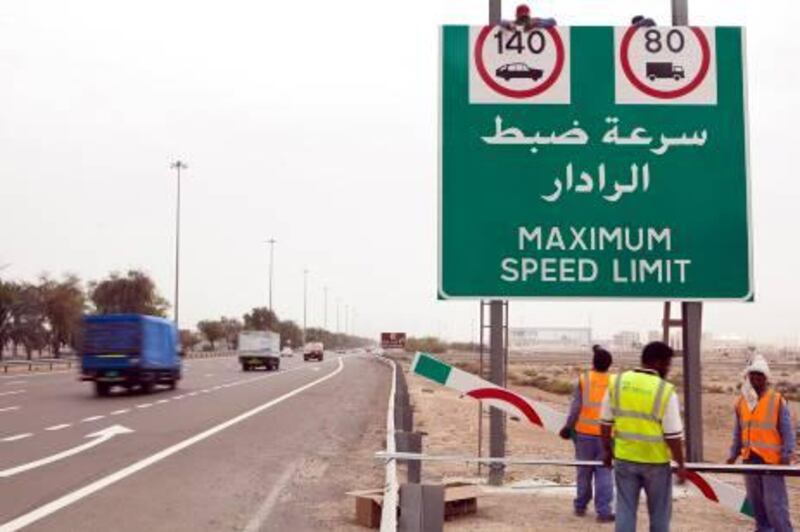ABU DHABI // New enforced speed limits of 140kph will take effect on major motorways from Sunday, with no tolerance for offenders, a top official from the Abu Dhabi traffic police said yesterday.
Brig Hussein al Harethi, head of the Traffic and Patrols Directorate, said that all roads from Ghwaifat and Abu Dhabi to Dubai will have the same enforced speed limit of 140kph, with no additional buffer.
"Since February 1, we changed the speed limit from Ghwaifat to Al Mafraq bridge to 140kph, and now we are changing the rest so it will be constant speed on the whole road," he said.
___________
Also
[ One killed, dozens injured in 127-car Abu Dhabi pile-up ]
[ 'The crashed cars loomed in front of me' ]
[ Warning signs 'could have averted pile-up' ]
___________
Drivers on the roads targeted will be alerted by green signs indicating the speed limit. The signs, which have already been installed, will be unveiled on Sunday, when the changes take effect, Brig al Harethi said.
The change will affect roads leading from Al Mafraq bridge to Saih Shoeib, from Al Mafraq bridge to Sas al Nakhal and from Sas al Nakhal to Dubai, where drivers could previously reach speeds of 160kph without being penalised.
Meanwhile, international transport experts said stricter enforcement must work alongside the reduced speed limits to make an impact on the behaviour of road users.
At the mobility and city transport exhibition in Dubai yesterday, Jose Galean, head of the department for urban transport systems at the transport engineering company Ineco, said increasing the penalties was "key to changing driving behaviour".
"Reducing the speed limit does not really reduce the number of accidents," he said. "The key issue is enforcement. In Spain, we tripled the penalty fees - what used to be €80 (Dh424) is now €300. The minimum penalty for passing the speed limit starts at €200."
Fines for exceeding the speed limit in Abu Dhabi start at Dh400. Black points are not given until a driver exceeds the limit by 50kph.
Exceeding the limit by more than 60kph will result in a Dh1,000 fine and 12 black points. The vehicle will also be confiscated for 30 days.
In Spain, such rigorous enforcement, coupled with a black point system and educational programmes, reduced the fatality rate by 50 per cent, Mr Galean said, from 2,000 to 1,000 per year.
"In 2003, our country had the highest rate of fatalities, now we are below the average," he said, adding that the Spanish and the Middle Eastern driving cultures were similar in that they were difficult to change.
A tie-up between insurance companies and a driver's record was also key for reward and punishment strategies, Mr Galean said.
"For example, if someone lost his licence due to black points, his insurance scheme would also be halted for the duration his licence is revoked," he said.
Increasing penalty fees was a common thread among several experts at the exhibition.
"In Germany, parts of the roads are monitored by radar and parts are not, and many didn't used to follow the speed limits," said Hans Blankestijn, a sales manager at Trapeze ITS. "Things changed when the penalty increased from €100 to €300."
However, drivers on UAE roads were reluctant to say that increasing the penalty fees is the best approach. Ahmed Ali, an Abu Dhabi resident from Egypt, said that raising the ticket costs could change driving behaviour, but "for the wrong reasons".
"You will have a bunch of drivers who are following the rules because they don't want to pay the price, not because it's the right thing to do," he said. "But I guess, at the end of the day, either way, it would help save lives."
* Additional reporting by Haneen Dajani






